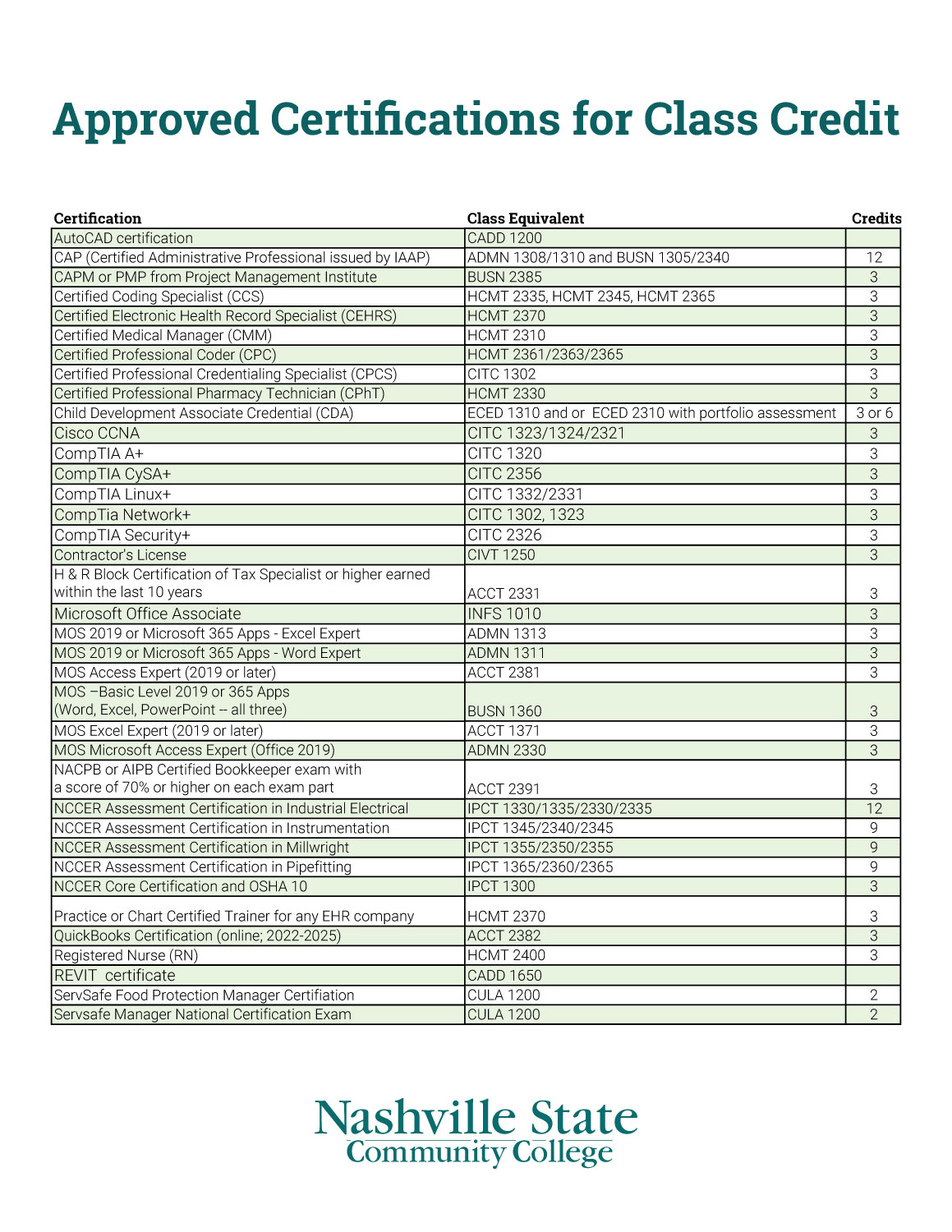Credit for Previous Experience
Earn Credit for What You Know, Finish Faster
Prior Learning Assessment (PLA) gives students the opportunity to demonstrate learning done outside of Nashville State to potentially earn college credit and earn a degree in less time and expense.
PLA is the evaluation and assessment of an individual’s life learning for college credit, certification, or advanced standing toward further education or training. Evaluation of all PLA options is done by content experts and department deans in accordance with established policies, equivalencies, and course outcomes. Credits awarded for PLA will be applied to the transcript and progression to graduation.
>> Prior Learning Assessment Form
PLA Credit Requirements
- Students must be admitted to Nashville State Community College
- Students must have declared an academic program
- Credits must directly apply to the curriculum requirements of the declared program. Please note that changing majors will result in a reassessment of the applicability of the credit.
Types of PLA

College credit for military training and service may be awarded through the direct evaluation of the service transcripts. For students that attend Department of Defense schools, many have their own transcripts separate from the Joint Service Transcript. Students are encouraged to send both.
Advanced Placement (AP) Exams
A series of tests developed by the College Board, initially for AP High School courses.


Dual Credit Program
"A postsecondary course, taught in a high school by certified instructors. The successful completion of Dual Credit prepares a student to sit for a postsecondary challenge examination. The student's score on the challenge examination shall be used by a postsecondary institution to determine the granting of postsecondary credit towards a diploma or a certificate or an associate or baccalaureate degree."
International Baccalaureate Programs (IB)
The IB Program is an internationally accepted qualification for entry into institutions of higher education, much like the AP program. The Diploma Program is designed for students aged 16 to 19; it is a demanding two-year curriculum leading to final examinations. Graduates of the IB program must demonstrate competency in languages, social studies, experimental sciences, and mathematics.

Institutional Course Challenge Examination Credit
An academic program may allow students to receive credit for a course by taking a Challenge Exam for that course. The student must contact the individual program or department to learn about the availability and cost of course challenge examinations.
| BIOL 1000 - Medical Terminology | 3 | HLSC |
| INFS 1010 - Computer Applications | 3 | STEM |
| ADMN 1308 - Office Procedures | 3 | BAPS |
| ADMN 1310 - Business Communication | 3 | BAPS |
| ADMN 1302 - Keyboarding/Formatting I | 3 | BAPS |
| ADMN 1305 - Business English | 3 | BAPS |
| HMGT 1030 Intro to Hospitality | 3 | BAPS |
| HMGT 1040 Front Office Mgt | 3 | BAPS |
| HMGT 2805 Convention Mgt | 3 | BAPS |
| MATH 1000 - Foundations of Algebra | 3 | STEM |
| IPCT-1300 Industrial safety | 3 | STEM |
| IPCT-1330 Electrical I | 3 | STEM |
| IPCT-1335 Electrical II | 3 | STEM |
| IPCT-2330 Electrical III | 3 | STEM |
| IPCT-2335 Electrical IV | 3 | STEM |
| IPCT-1345 Instrumentation I | 3 | STEM |
| IPCT-2340 Instrumentation II | 3 | STEM |
| IPCT-2345 Instrumentation III | 3 | STEM |
| IPCT-1355 Millwright I | 3 | STEM |
| IPCT-2350 Milwright II | 3 | STEM |
| IPCT-2355 Millwright III | 3 | STEM |
| IPCT-1365 Pipefitting I | 3 | STEM |
| IPCT-2360 Pipefitting II | 3 | STEM |
| IPCT-2365 Pipefitting III | 3 | STEM |
College Level Examination Program (CLEP) Exams
The College Board offers nationally standardized CLEP exams that allow learners of any background to test in a variety of subjects. Please visit the College Board website for the most up-to-date information. When you take a CLEP exam, please request that your scores be sent to Nashville State Community College. If you have already taken them and did not have them sent, transcripts can be sent from the College Board website.

Locally Evaluated Industry and Workplace Credit
Nashville State may individually evaluate non-collegiate instructional programs, such as those for industry certifications, professional licensures, apprenticeships, and other local workplace trainings that demonstrate competency required for completion of degree or certificate programs. PLA credit can be awarded based on evaluation of the training or certification by programs. PLA credit can be awarded based on evaluation of the training or certification by faculty members in the student's program. Not all training that can be assessed for college-level credit is important in industry certifications, professional licensures, apprenticeships:
Apprenticeships: Apprenticeship is a combination of on-the-job training and related instruction in which workers learn the practical and theoretical aspects of a highly skilled occupation. Apprenticeship programs can be sponsored by individual employers, joint employer and labor groups, and/or employer associations.
Certification: Certification is a designation earned by a person that ensures the individual is qualified to perform a task or job. Certification differs from licensure in that certification is an employment qualification and not a legal requirement for practicing a profession.
Professional Licensure: Professional licensure protects the public by enforcing standards that restrict practice to qualified individuals who have met specific qualifications in education, work experience, and exams. Licensure is a means by which "permission to practice" is regulated. Licensure is required by law.
Portfolio Review Credit (or portfolio assessment credit)
A portfolio is prepared by the student to demonstrate and validate credit for learning acquired outside of the classroom and must be relevant to the student's degree program. Program faculty will evaluate the student portfolio, which will include documentation such as certificates of training, work samples, awards and honors, job descriptions, performance evaluations, samples of artwork, evidence of self-directed learning, and resumes. A portfolio course may be offered by the institution. Assessment of portfolios course-specific prior learning should be completed by appropriately credentialed faculty/staff approved by the institution granting the assessed credit, academically qualified in the assessed discipline and institutional knowledge, to assign and document credit appropriately.
Students may earn college credit for additional forms of PLA not mentioned above through a process by which program faculty have determined that student prior learning meets student outcomes of a particular class. Assessment of course-specific prior learning not defined above should be completed by appropriates credentialed faculty/staff approved at the institution granting the assessed credit, academically qualified in the assessed discipline and institutional knowledge to assign and document credit appropriately and approved by the instructional dean. If there are questions as to what may qualify as "other forms of PLA", please reach out to the contact listed below.
Contact
Sarah Roberts

